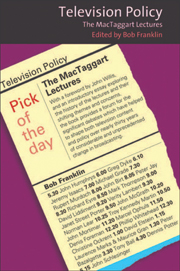Book contents
- Frontmatter
- Contents
- Acknowledgements
- Foreword
- Introduction
- The James MacTaggart Lectures
- TV Drama: The Case against Naturalism
- Naturalism and Television
- Taboos in Television
- Signposting Television in the 1980s: The Fourth Television Channel
- Television Drama, Censorship and the Truth
- The Day after Tomorrow: The Future of Electronic Publishing
- The Primacy of Programmes in the Future of Broadcasting
- Reflections on Working in Film and Television
- ‘Opening up the Fourth Front’: Micro Drama and the Rejection of Naturalism
- Power and Pluralism in Broadcasting
- Ethics, Broadcasting and Change: The French Experience
- Freedom in Broadcasting
- Deregulation and Quality Television
- The Future of Television: Market Forces and Social Values
- The Future of the BBC
- Occupying Powers
- A Culture of Dependency: Power, Politics and Broadcasters
- Talent versus Television
- A Glorious Future: Quality Broadcasting in the Digital Age
- Rewarding Creative Talent: The Struggle of the Independents
- Television versus the People
- Public-Interest Broadcasting: A New Approach
- A Time for Change
- The Soul of British Television
- Television's Creative Deficit
- Freedom of Choice: Public-Service Broadcasting and the BBC
- First Do No Harm
- Appendix A Edinburgh International Television Festival, 29 August–2 September 1977: Programme
- Appendix B Précis of Ted Turner, James MacTaggart Lecture 1982; Dr Jonathan Miller, James MacTaggart Lecture 1983
- Index
Naturalism and Television
from The James MacTaggart Lectures
Published online by Cambridge University Press: 05 August 2013
- Frontmatter
- Contents
- Acknowledgements
- Foreword
- Introduction
- The James MacTaggart Lectures
- TV Drama: The Case against Naturalism
- Naturalism and Television
- Taboos in Television
- Signposting Television in the 1980s: The Fourth Television Channel
- Television Drama, Censorship and the Truth
- The Day after Tomorrow: The Future of Electronic Publishing
- The Primacy of Programmes in the Future of Broadcasting
- Reflections on Working in Film and Television
- ‘Opening up the Fourth Front’: Micro Drama and the Rejection of Naturalism
- Power and Pluralism in Broadcasting
- Ethics, Broadcasting and Change: The French Experience
- Freedom in Broadcasting
- Deregulation and Quality Television
- The Future of Television: Market Forces and Social Values
- The Future of the BBC
- Occupying Powers
- A Culture of Dependency: Power, Politics and Broadcasters
- Talent versus Television
- A Glorious Future: Quality Broadcasting in the Digital Age
- Rewarding Creative Talent: The Struggle of the Independents
- Television versus the People
- Public-Interest Broadcasting: A New Approach
- A Time for Change
- The Soul of British Television
- Television's Creative Deficit
- Freedom of Choice: Public-Service Broadcasting and the BBC
- First Do No Harm
- Appendix A Edinburgh International Television Festival, 29 August–2 September 1977: Programme
- Appendix B Précis of Ted Turner, James MacTaggart Lecture 1982; Dr Jonathan Miller, James MacTaggart Lecture 1983
- Index
Summary
Marcel Ophuls, the maker of television documentaries such as The Sorrow and the Pity, Sense of Loss and Memory of Justice, opens his lecture on a biographical note, expressing his admiration for his father, Max Ophuls, and describing how he himself became what he deprecatingly describes as ‘a self indulgent specialist of four-and-a-half talking-head marathons’: i.e. documentaries. Ophuls declares himself the spiritual as well as the biological offspring of his father, sharing fully ‘his assessments of the shallow, anti-creative, anti-humanist and authoritarian theories which seemed to us … the systematic foundations of the naturalist tendency’. His critique of naturalism explores, but strongly contests, themes addressed by John McGrath a year earlier at the initial festival in 1976: ‘John McGrath and I do not agree at all,’ he acknowledges, ‘on the nature, on the causes or the definition of the naturalist tradition.’
Ophuls begins his lecture with a recollection of a damp, November evening in London when, as a freelance seeking a job, he went to a meeting in Golden Square. As the discussion moved to the ‘techniques of naturalism – its social functions and its social mission and its social purpose’ Ophuls recalls the ‘irresistible urge’ to say that he ‘much preferred the realism of Noel Coward's This Happy Breed … to the elaborately bleak naturalism of Cathy Come Home’.
- Type
- Chapter
- Information
- Television PolicyThe MacTaggart Lectures, pp. 45 - 52Publisher: Edinburgh University PressPrint publication year: 2005

